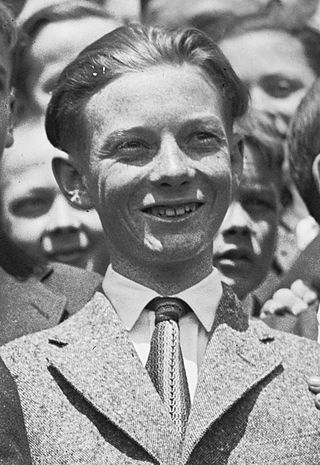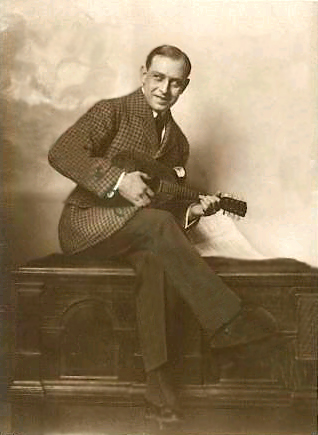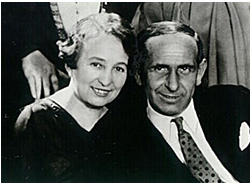Related Research Articles

Allan Dwan was a pioneering Canadian-born American motion picture director, producer, and screenwriter.

Frank William George Lloyd was a Scottish-American film director, screenwriter, producer and actor. He was among the founders of the Academy of Motion Picture Arts and Sciences, and was its president from 1934 to 1935.

Robert Wiene was a German film director, screenwriter and producer, active during the silent era. He is widely-known for directing the landmark 1920 film The Cabinet of Dr. Caligari and a succession of other expressionist films. Wiene also directed a variety of other films of varying styles and genres. Following the Nazi rise to power in Germany, Wiene, who was of Jewish descent, fled into exile.

Roy William Neill was an Irish-born American film director best known for producing and directing almost all of the Sherlock Holmes films starring Basil Rathbone and Nigel Bruce, made between 1943 and 1946 and released by Universal Pictures.

Marshall Ambrose "Mickey" Neilan was an American actor, director, producer, and screenwriter, whose work in films began in the early silent era.

Wesley Barry was an American actor, director, and producer. Barry began his career as a child actor in silent motion pictures and later became a producer and director of both film and television. As a director, he was sometimes billed as Wesley E. Barry.

Heinrich Piel, known professionally as Harry Piel, was a prolific German actor, film director, screenwriter, and film producer who was involved in over 150 films.

Frederic Zelnik was an Austrian producer, director, and actor. He was one of the most important producers-directors of the German silent cinema. Zelnik achieved success through period operetta films in the 1920s and 1930s.
Maurice Elvey was one of the most prolific film directors in British history. He directed nearly 200 films between 1913 and 1957. During the silent film era he directed as many as twenty films per year. He also produced more than fifty films – his own as well as films directed by others.

Herbert Blaché, born Herbert Reginald Gaston Blaché-Bolton was a British-born American film director, producer and screenwriter, born of a French father. He directed more than 50 films between 1912 and 1929.

Eliot Stannard was an English screenwriter and director. He was the son of civil engineer Arthur Stannard and Yorkshire-born novelist Henrietta Eliza Vaughan Palmer. Stannard wrote the screenplay for more than 80 films between 1914 and 1933, including eight films directed by Alfred Hitchcock. He also directed five films. During the early 1920s, he worked on most of the screenplays for the Ideal Film Company, one of Britain's leading silent film studios.

Jacob Fleck was an Austrian film director, screenwriter, film producer and cameraman. He is noted for his long-standing professional partnership with his wife Luise Fleck who co-directed his films with him.

Adelqui Migliar, also known as Adelqui Millar, was a Chilean film actor, director, writer and producer. He appeared in 31 silent films between 1916 and 1928. He also directed 24 films between 1922 and 1954. He was born in Concepción, Chile, and lived and worked in the Netherlands, the United Kingdom and the United States. He died in Santiago, Chile.
Albert Victor Bramble (1884–1963) was an English actor and film director. He began his acting career on the stage. He started acting in films in 1914 and subsequently turned to directing and producing films. He died on 17 May 1963.
Walter Alabaster West was an English film director and producer. He was a partner in the film production company Broadwest Films.
Hepworth Picture Plays was a British film production company active during the silent era. Founded in 1897 by the cinema pioneer Cecil Hepworth, it was based at Walton Studios west of London.
The Ideal Film Company was a British film production and distribution company that operated between 1911 and 1934.
Anglo-Hollandia was a British-Dutch film production company which operated between 1919 and 1923 during the silent film era. It had its roots in the existing Dutch company Hollandia Films and attempted to produce films with appeal to both Britain and the Netherlands.
Edward J. Montagne (1885–1932) was a British screenwriter who worked in the American film industry during the silent era. He worked with prominent studios of the era such as Vitagraph, Selznick Pictures and Universal Pictures. He was the father of the producer and director Edward Montagne.
Astra Films was a British film production and distribution company of the silent era. It was set up in Leeds following the First World War by the film director Herbert Wilcox, his younger brother Charles Wilcox and H.W. Thompson, a leading figure in film distribution in the North of England. After the company's initial success, Wilcox left the firm to set up on his own and rose to become one of the most successful independent producer-directors in the world. After a merger the company released films under the name Astra-National.